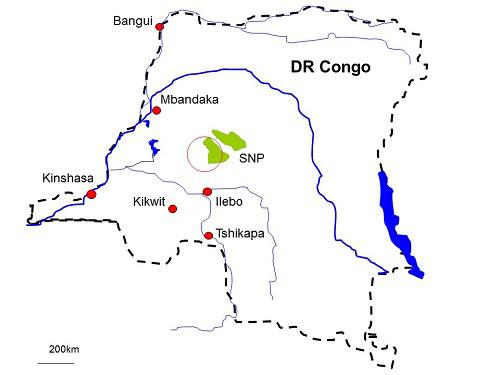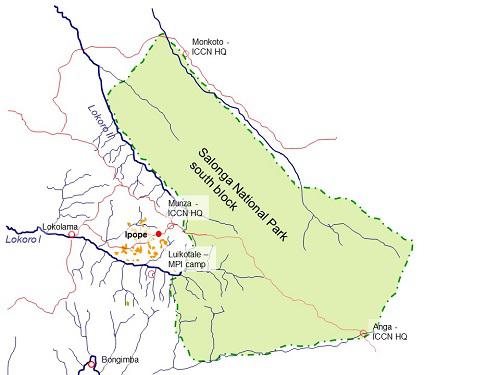Eric Jonas Eriksson
This project aims to strengthen the efficacy of the ICCN Rangers patrol of Park borders by integrating the participation of villagers and thereby also increasing local awareness of community owned forest.

DR Congo.
The Salonga National Park is one of the world’s largest protected rain forest habitats and covers a total of 35,000 km2 and deserves attention for being one of the few existing mega areas with its original habitat and fauna still intact. Animals encountered include important species such as forest elephant, bongo, bonobo and unstudied monkey species such as the golden bellied mangabey and allen’s swamp monkey.

Bolongo.
With the end of the civil war large quantities of military weapons have become available to the civilian community and are used in the commercial bush-meat trade. The hunters enter the area both from the northern town of Mbandaka, using the rivers and from a southern village called Bongimba without the owner’s permission and are therefore locally considered as trespassers. The hunters target elephants, monkeys and bonobos using automatic weapons and the terrestrial fauna (duikers and bush pigs) using wire-snares. The meat is smoked-dried in the forest and then transported either north on the rivers to be sold to bush-meat merchants in Mbandaka or carried out of the forest and transported south on bicycles to the mining town of Tschikapa. If this large scaled exploitation is not stopped the park’s fauna may be devastated beyond recovery.
This pilot study is a first step to achieve practical conservation of the habitat and animals in the Salonga National Park by including the surrounding community forests and thus engaging local people in the effort. Conservation is a long term process beginning with local people having to appreciate their own resources. The people surrounding the Salonga national Park have traditional claim to large forests, parts of which currently is not being used by village hunters because of its remoteness, but are regarded as ancestors’ gift for the future. Currently the park and community forests are being exploited by non-resident hunters for the commercial bush-meat trade without providing benefits to the forest’s traditional owners who without sufficient arms can do little to deter the intruders. A joint patrol of villagers and guards, will strengthen village ownership, increase appreciation of natural resources and strengthen the relationship between park guard and villagers.
An increased protection of the park borders and community forests enables future community based conservation actions, such as ecotourism and various scientific research, to take place. Results from this relatively small pilot study will be useful in attempts to establish community participative conservation in other regions around the park.